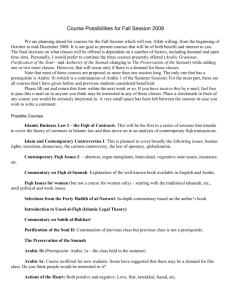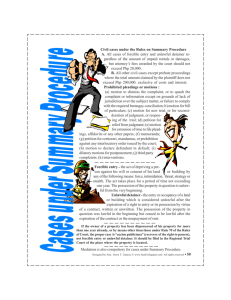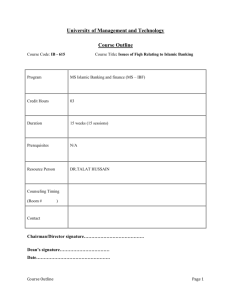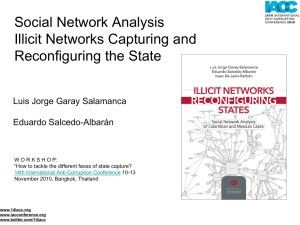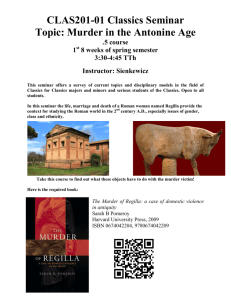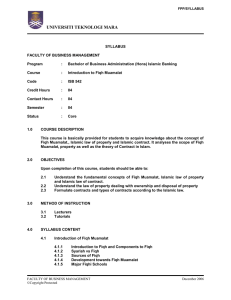Classical Legal Scholarship and the Development of
advertisement
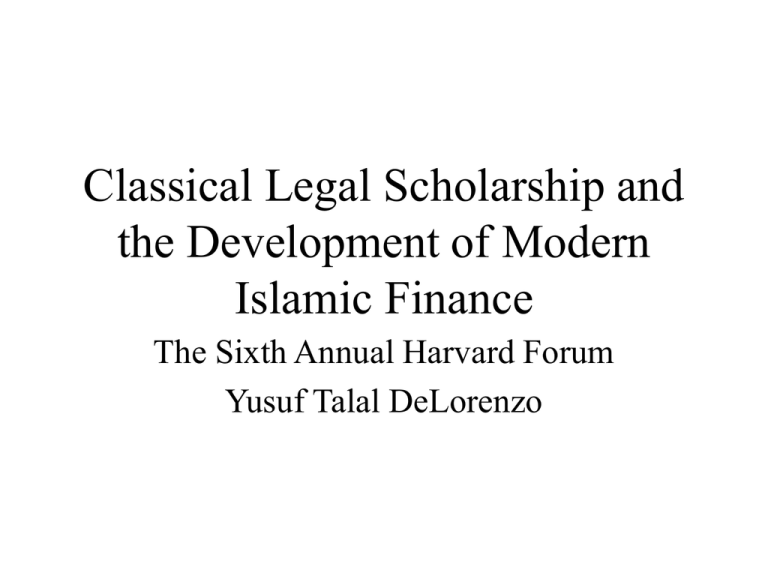
Classical Legal Scholarship and the Development of Modern Islamic Finance The Sixth Annual Harvard Forum Yusuf Talal DeLorenzo Said the Prophet of Allah, upon him be peace and blessings: “The lawful is self-evident, and the unlawful is self-evident; while between the two are dubious matters not well understood by very many people… …Those who avoid the dubious will protect their honor and their religion. But those who engage in the dubious will eventually commit something unlawful; in the same way that a shepherd who grazes his herd on the edge of a preserve will eventually trespass on it."[i] [i] Bukhari (1910, 50), Muslim (2996), Nasa’i (5303), Tirmidhi (1126), Ibn Majah (3974), A^mad (17649, 17645), DaramÏ (169, 2419) Mushtabihat and Mushabbahat Things, or affairs that are confused by reason of their resembling one another or from any other cause. E. W. Lane, Arabic Lexicon Why “Dubious”? Mushtabihat and Mushabbahat Things, or affairs that are confused by reason of their resembling one another or from any other cause. E. W. Lane, Arabic Lexicon • matters not well understood by most people are … • undecided and fraught with uncertainty dubious Abu Hamid al-Ghazali in The Revival These three [categories] continue to apply regardless of how situations change. However, since the negative consequences of negligence have spread throughout the religion, and since its sparks have drifted throughout creation, it has become necessary to expose the face of its corruption by explaining the differences between the lawful, the unlawful, and the dubious in a manner that verifies and clarifies. Moreover, while there may be constraints, the task is not impossible. The Lawful and the Unlawful, Chapter Two The “Development” of Modern Islamic Finance • Research and Development must be practical and goaloriented • Research and Development must be informed by expertise: – Shari`ah – Legal – Business Shari`ah Methodology (1) • Four sources of Islamic Law • The inner dynamic of Shari`ah – Ijtihad – Vitality through Ijtihad – The need for a subject • Law without a subject is law that has lost its vitality Shari`ah Methodology (2) • Fiqh as jurists’ law – SSB standards • No stare decisis – consensus • No Uniform Code – AAOIFI and IFSB industry standards • Fiqh is a shared endeavor – Between God, the Lawgiver and man, the interpreter – Between jurists of the same and different times and places – Between theory and practice… subject The Value of the Classics • Explain the revelational sources • Elucidate the thought of the legal masters • Illustrate successful legal methodologies from the past • Guide interpretation • Serve as points of departure The Variety of the Classics (1) • Handbooks of Practical Jurisprudence which explain the “rules” according to the classical schools of legal thought • Exhaustive works, standard works, summaries and compendiums • Commentaries and glosses • In English, for example, – The Hedaya – Reliance of the Traveler – The Distinguished Jurist’s Primer – Majallah al-Ahkam alAdaliyah The Variety of the Classics (2) • Handbooks of theoretical jurisprudence which explain the methodology for deriving “rules” of law • Digests of case law or collected fatawa • The Search for God’s Law • Moohummudan Law of Sale According to the Huneefeea Code The Variety of the Classics (3) • Legal literature: – Legal maxims – Legal dictionairies – Legal commentaries of the Qur’an and the hadith literature • In English… nothing The Search for More Material (1) • Unpublished manuscripts of the sorts of fiqh literature mentioned above – Published works represent less than 10% of the total – Fatwa literature archived in Cairo, Damascus, Istanbul, Tonk, Patna, Hyderabad…every Muslim country – Historical records, archives of trade documents, even Italian archives and other Mediterranean countries The Search for More Material (2) • Beyond Fiqh – Tasawwuf • Stress on moral rectitude and purification, even in mundane matters • Zuhd literature • Comprehensive Manuals – In English • The Revival of the Religious Sciences We have done no more than to point out the main features here in order that the aspirant may know that, if his daily bread comes from different sources, rather than a single known source, then he cannot do without knowledge of these matters. Thus, before he consumes anything, from whatever source, he should question those in possession of knowledge about these matters, rather than undertake anything in ignorance. For, as it may be asked of a scholar, `Why are your actions inconsistent with your knowledge?' it may be asked of an ignorant person, `Why are your actions consistent with your ignorance?'

